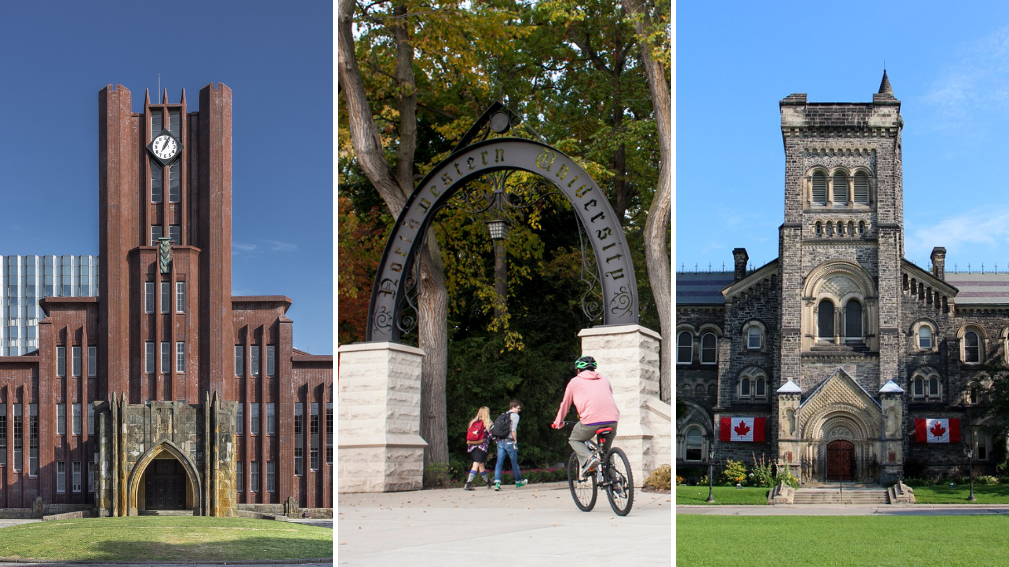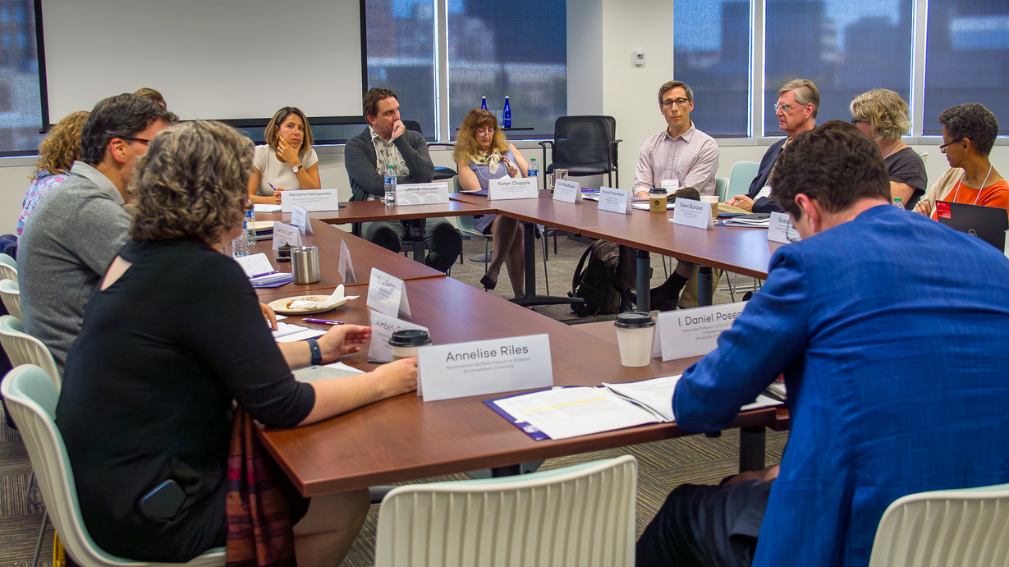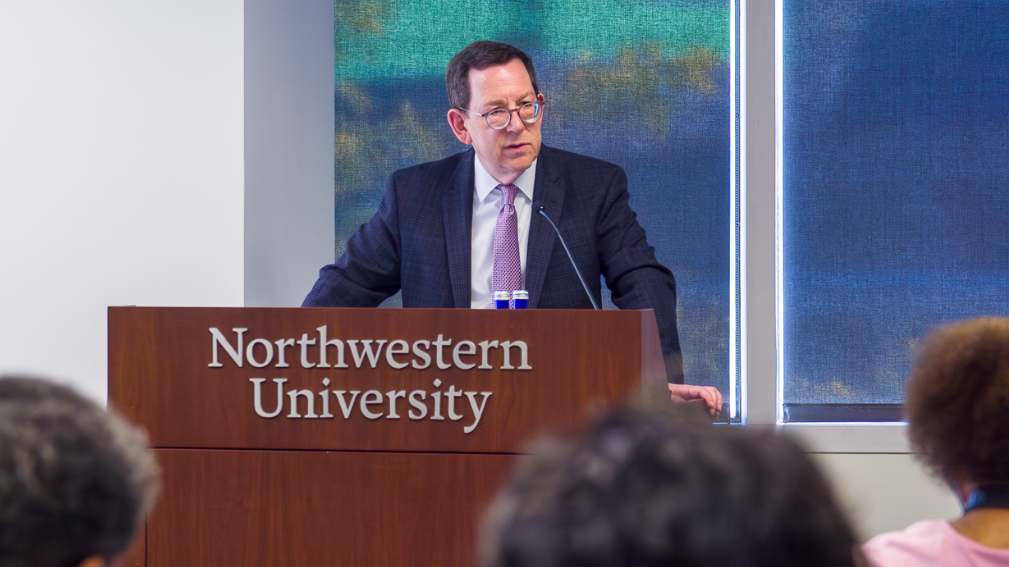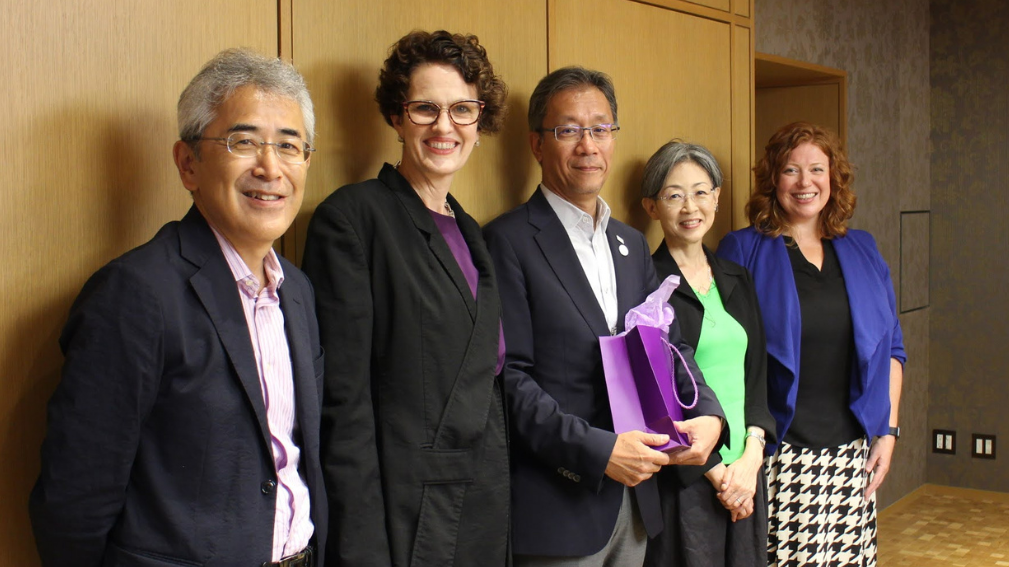Northwestern Buffett Global Social Innovation Hubs in Tokyo and Toronto Catalyze Transnational Research to Address Global Challenges
Two new global social innovation hubs will foster promising opportunities for decarbonization and artificial intelligence.

Photo credits (left to right): The University of Tokyo, Northwestern University and the University of Toronto
This fall, the Northwestern Roberta Buffett Institute for Global Affairs is launching two new Global Social Innovation Hubs with the University of Toronto and The University of Tokyo. Through faculty leadership, these hubs will serve as centers for transnational, interdisciplinary research on pressing global challenges.
“Northwestern Buffett’s Global Social Innovation Hubs are a critical step forward for advancing the type of global intellectual and scientific leadership that shows promise for generating solutions to increasingly complex problems like climate change and social inequality,” said Annelise Riles, Executive Director of the Northwestern Buffett Institute and Associate Provost for Global Affairs at Northwestern University. “New approaches to taking on the world’s most pressing challenges won’t come from one institution, country or field. By catalyzing collaborations that bring together the brightest minds from across disciplinary departments at universities around the world, we hope that these new hubs will help fuel progress toward reaching shared global goals.”
The hubs will offer a “nexus space” for faculty and students from Northwestern and partner institutions to pool resources and expertise, engage thought leaders from industry and civil society and contribute to addressing complex global challenges. Global Social Innovation Hubs will build upon existing research and learning partnerships and will encompass a range of activities, including:
- Joint research initiatives and co-authored publications
- Innovation projects to create needed products or services in collaboration with local private sector entities, government agencies and civil society
- Educational programming, including joint learning, study abroad, student exchange and internship programs
- Opportunities for scholar mobility, graduate student exchange and joint postdoctoral fellows
Northwestern Buffett’s first two Global Social Innovation Hubs, co-established with the University of Toronto and The University of Tokyo, will focus on decarbonization and artificial intelligence (AI), respectively.

Professors from the University of Toronto and Northwestern University participated in a two-day workshop at the Northwestern Roberta Buffett Institute for Global Affairs exploring issues of decarbonization at the interface of society, culture, science and technology.
A Decarbonization Alliance for the Next Generation
The University of Toronto-Northwestern Decarbonization Alliance (TNDA) is led by the Paula M. Trienens Institute for Sustainability and Energy and the Roberta Buffett Institute for Global Affairs at Northwestern, as well as Climate Positive Energy and the Office of the Vice President (International) at the University of Toronto.
The partnership officially launched during an inaugural conference in Evanston, Illinois, on October 2–3, Roadmapping the Clean Energy Transition: Dialogues at the interface of society, culture, science and technology. This two-day series of workshops and presentations convened faculty from both institutions to catalyze research on progressive decarbonization—efforts to reduce carbon dioxide emissions from the atmosphere and prevent further global warming.

Northwestern University President Michael Schill gives opening remarks at the series of keynote presentations marking the launch of the Toronto-Northwestern Decarbonization Alliance
"By melding together insights into decarbonization from the social sciences, physical sciences, engineering, humanities and other realms, researchers in the Alliance aim to develop new modes of thinking about sustainability, develop the next generation of technologies needed to achieve net-zero emissions and foster widespread adoption of those technologies across sectors," said Professor Ted Sargent, Co-Executive Director of the Trienens Institute for Sustainability and Energy at Northwestern.
At the Alliance launch, participating faculty including Northwestern’s Jennifer Dunn, Daniel Horton, Sossina Haile, Brad Sageman, Ted Sargent, Kimberly Marion Suiseeya, G. Jeffrey Snyder, Michael R. Wasielewski and Keith Woodhouse discussed emerging research activities and gave public keynotes on their recent work covering topics ranging from climate justice to alternative energy solutions to how the humanities can help the world move toward a decarbonized future.
“Developing the pathways to decarbonization is an urgent global issue, requiring global partnerships and diverse disciplinary approaches,” said Gwen Burrows, Assistant Vice-President, International Engagement and Impact at the University of Toronto. “The University of Toronto and Northwestern University are two global leaders in developing innovations to tackle climate change, with strong collaborations already in place on which to build. We look forward to continuing to support the development of new innovations through this important initiative.”

Meeting with Teruo Fujii, President of The University of Tokyo, in September 2023
Pictured (left to right): Yujin Yaguchi, Annelise Riles, Teruo Fujii, Kaori Hayashi and Meghan Ozaroski
Photo credit: The University of Tokyo
Probing the Intersections between Culture and AI
In early September, Northwestern and The University of Tokyo launched a Global Social Innovation Hub centered on Cultures of AI—exploring how new and near-future developments will impact our cultures, change our norms and values, and shape scientific innovation. The partnership is led by the Roberta Buffett Institute for Global Affairs at Northwestern and the B’AI Global Forum at The University of Tokyo.
Through this partnership, faculty from both institutions are embarking on joint research initiatives to study the impact of AI with the goal of guiding and amplifying benefits while understanding and reducing the harms.
“Over the last few years, we have seen explosive growth work and applications of Artificial Intelligence (AI). In Journalism, Law, Education, Business, and Medicine, AI has been transforming fields in ways that go beyond the individual,” says Professor Kristian Hammond, Bill and Cathy Osborn Professor of Computer Science at Northwestern. “It is transforming how we work, the ways in which we interact, and the very structure of our society. While there is awareness of this impact, we have yet to see the rise of a clear vision of how to guide this transformation.”
Northwestern faculty from across the University’s schools attended the Cultures of AI Global Social Innovation Hub launch in Tokyo—including Professors Kristian Hammond, Duri Long, V.S. Subrahmanian and Marcelo Worsley—to examine ways to join together to make AI safe and control its impact, foster AI literacy, reshape global security using AI and explore AI’s role in inclusive education.
“By forming this new partnership, The University of Tokyo and Northwestern University will bring together a group of global and interdisciplinary faculty experts to identify and explore the new world of questions around the social implications of AI,” says Kaori Hayashi, Executive Vice President for Globalization and Diversity, Equity, and Inclusion at The University of Tokyo and Founder of the B’AI Global Forum. “Together, we will pursue a world that inspires positive and safe social uses of technology and pursues gender equity and minority rights.”
Last year, a delegation from The University of Tokyo visited Northwestern for a panel on Gender and Artificial Intelligence: Striving for social justice and protection of rights in that age of AI, laying the groundwork for this hub.

Cultures of AI hub delegation visit to the SoftBank Executive Briefing Center, an industry partnership with the B’AI Global Forum at The University of Tokyo
Photo credit: The University of Tokyo
What’s Next for Northwestern Buffett’s Global Social Innovation Hubs?
“In our work with the University of Toronto and The University of Tokyo we are advancing research in subjects that are critical but are yet unformed,” says Annelise Riles. “Northwestern Buffett and our partners are developing new infrastructure to bring together the disciplines and the global perspectives needed to develop solutions for the benefit of our global community.”
Through strategic investments at Northwestern, the University of Toronto, and The University of Tokyo, the activities of these hubs will begin immediately through new faculty, post-doctoral, and graduate student exchanges, regular conferences and workshops, undergraduate exchanges and learning opportunities, and formalized joint research programming.
In the coming years, Northwestern Buffett will expand its network of Global Social Innovation Hubs by partnering with new global institutions and focusing on different global issues.
